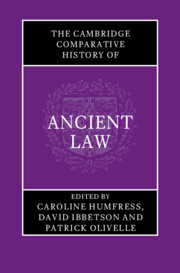Book contents
- The Cambridge Comparative History of Ancient Law
- The Cambridge Comparative History of Ancient Law
- Copyright page
- Contents
- Figures
- Maps
- Contributors
- Preface
- Additional material
- Additional material
- Abbreviations
- Maps
- 1 Orientation
- 2 Law as Text
- 3 Legal Science
- 4 War, Peace and Interstate Relations
- 5 Law and the State
- 6 Law and Religion
- 7 Legal Procedure
- 8 Status and Family
- 9 Crime, Redress and Social Control
- 10 Property
- 11 Commerce and Contracts
- 12 Conclusion
- Bibliography
- Index
9 - Crime, Redress and Social Control
Published online by Cambridge University Press: 09 May 2024
- The Cambridge Comparative History of Ancient Law
- The Cambridge Comparative History of Ancient Law
- Copyright page
- Contents
- Figures
- Maps
- Contributors
- Preface
- Additional material
- Additional material
- Abbreviations
- Maps
- 1 Orientation
- 2 Law as Text
- 3 Legal Science
- 4 War, Peace and Interstate Relations
- 5 Law and the State
- 6 Law and Religion
- 7 Legal Procedure
- 8 Status and Family
- 9 Crime, Redress and Social Control
- 10 Property
- 11 Commerce and Contracts
- 12 Conclusion
- Bibliography
- Index
Summary
This chapter deals with all manner of state-derived prohibitions. Ancient states prohibited a broad variety of behaviours, threatening punishment for those who would transgress boundaries. The logic of prohibition was wide-ranging: from the marking of spaces, objects and officials as somehow distinct from the rest of ‘society’, leading factions within ancient states sought to preserve and protect their individual prerogatives. They also sought to reinforce their claims to leadership by incentivizing subjects to settle their disputes in state-sanctioned venues. The evidence for such prohibitions is extensive, but did they add up to something that we might legitimately call ‘social control’? Did ancient states succeed at inducing subject populations to accept their claims to rule? If so, how? This chapter suggests that the logic of prohibition was a site of contestation for both statecraft and subject-craft.
- Type
- Chapter
- Information
- The Cambridge Comparative History of Ancient Law , pp. 446 - 511Publisher: Cambridge University PressPrint publication year: 2024

